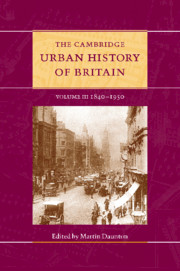Book contents
- Frontmatter
- 1 Introduction
- Part I Circulation
- Part II Governance
- 9 Central goverment and the towns
- 10 The changing functions of urban government: councillors, officials and pressure groups
- 11 The political economy of urban utilities
- 12 The provision of social services
- 13 Structure, culture and society in British towns
- Part III Construction
- Part IV Getting and spending
- Part V Images
- Select bibliography
- Index
- Plates 1-7
- Plates 8-14
- Plates 15-20
- Plates 21-27
- Plates 28-34
- Plates 35-41
- Plates 42-48>
- Plates 49-53
- References
13 - Structure, culture and society in British towns
from Part II - Governance
Published online by Cambridge University Press: 28 March 2008
- Frontmatter
- 1 Introduction
- Part I Circulation
- Part II Governance
- 9 Central goverment and the towns
- 10 The changing functions of urban government: councillors, officials and pressure groups
- 11 The political economy of urban utilities
- 12 The provision of social services
- 13 Structure, culture and society in British towns
- Part III Construction
- Part IV Getting and spending
- Part V Images
- Select bibliography
- Index
- Plates 1-7
- Plates 8-14
- Plates 15-20
- Plates 21-27
- Plates 28-34
- Plates 35-41
- Plates 42-48>
- Plates 49-53
- References
Summary
At the start of the period covered by this volume, two men wrote about social relationships in British towns in very different ways. Thomas Chalmers was a Scottish minister of religion. He spent much energy trying to reconcile political economy and evangelical religion. In 1821, he wrote:
In a provincial capital, the great mass of the population are retained in kindly and immediate dependence on the wealthy residents of the place. It is the resort of annuitants, and landed proprietors, and members of the law, and other learned professions, who give impulse to a great amount of domestic industry, by their expenditure; and, on inquiry into the sources of maintenance and employment for the labouring classes there, it will be found they are chiefly engaged in the immediate service of ministering to the wants and luxuries of the higher classes in the city. This brings the two extreme orders of society into that sort of relationship which is highly favourable to the general blandness and tranquillity of the whole population. In a manufacturing town on the other hand, the poor and the wealthy stand more disjointed from each other. It is true they often meet, but they meet more on an arena of contest, than on a field where the patronage and custom of the one party are met by the gratitude and good will of the other. When a rich customer calls a workman into his presence, for the purpose of giving him some employment connected with his own personal accommodation, the general feeling of the later must be altogether different from what it would be, were he called into the presence of a trading capitalist, for the purpose of cheapening his work, and being dismissed for another, should there not be an agreement in their terms.
Keywords
- Type
- Chapter
- Information
- The Cambridge Urban History of Britain , pp. 395 - 426Publisher: Cambridge University PressPrint publication year: 2001
References
- 4
- Cited by

